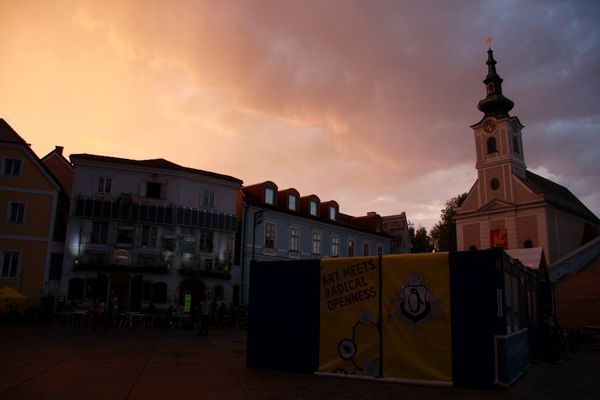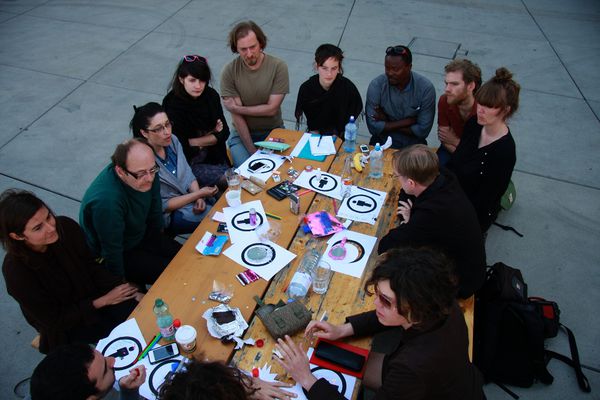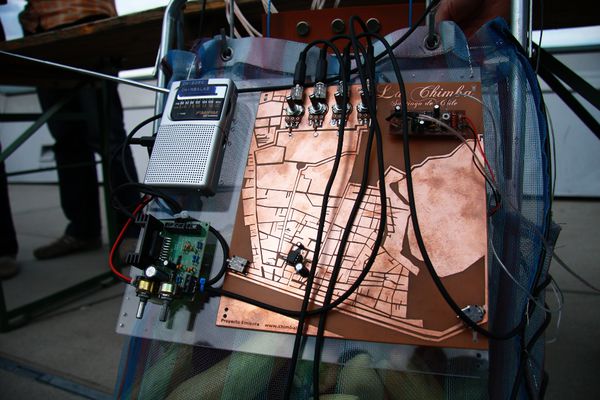User:Dave Young/1-3/Liwoli
Notes on LiWoLi
When looking at the Liwoli programme the week before the festival, my first thoughts were about how could I somehow fit in all the lectures/workshops/performances/interventions that had caught my interest. The calendar for the three days was very busy, packed with various events that all somehow seemed to connect with my own research here in Networked Media. In the end I somehow managed to participate in more than what my time spent in Linz seemed to allow for.
Heath Bunting's New Identity workshop on Thursday promised a practical exploration of the political and bureaucratic control systems we as citizens are subject to every day. After a discussion about these mechanisms of 'human verification' and identity control - particularly in the UK - I felt both depressed yet somewhat positive: the systems were undoubtedly oppressive and dangerous if you don't fit the "default racial profile", but there are a surprising amount of opportunities to work the system in your favour. It seems that the over-abundance of rules creates more loopholes to squeeze through. Having said that, the trajectory that governmental policy is following in these areas is not at all promising for those who hope to retain some basic civil liberties. Fuelled by the standard conspiracy panic triangle of child pornography, terrorism, and criminal behaviour, the control systems Heath Bunting explores are in flux, and I can see his New Identity flowchart going through various iterations over the coming years.
"I just don't understand why some people might criticise these proposals. I have no doubt conspiracy theorists will come up with some ridiculous claims about how these measures are an infringement of freedom. But without changing the law, the only freedom we would protect is that of criminals, terrorists and paedophiles." (Theresa May in an interview with The Sun about the 'Snoopers Charter', as quoted by the Guardian)
On Thursday night, Dmytri Kleiner gave a very insightful talk on the Telekommunist Manifesto - using network topologies as a clever metonymic device for the behvaiours of economic systems. I hadn't read the manifesto before hearing the talk, but I found these theories of Telekommunisten very influential, and encouraged me to rethink the assembly of these economic models. Later, Restlichtverstärker performed an excellent set of pd/gem driven gothic shoegaze techno - proving the power of the software for live beat-driven performance. Heads nodded, and feet tapped the floor.
Friday morning brought a humid cloak, and the sun scorched the concrete paler. I went across town to construct a MeeBlip, Peter Kirn's hackable digital MIDI-controllable synthesizer. The workshop was as you might expect - a large group of guys (and two girls), sitting around indoors with soldering irons and conversation revolving around the occasional question about the polarity of electrolytic capacitors and "who has the 220 ohm resistors?" I built my kit as fast as I could and got out of there by the afternoon so I could be outside, and to link up with Heath Bunting's tree climbing workshop. What began as a simple exercise in revisiting a childhood playful union with natural spaces became something deeper, more about courage and control over your own body when your adrenalin is flowing. You may be only a 3 or 4 meters off the ground, but your limbs often don't behave as you wish they would when you have nothing but air beneath you.
Back outside the Stadtwerkstatt, we sat in on some artist talks, notably Linda Hilfling who talked about a number of her past projects including A Public Domain.
On Saturday morning, I presented my talk Precognitive Systems/Cybernetic Ideologies. The title is a kind of lazy portmanteau of the subjects of two essays I have worked on with Steve Rushton. I ad-hoc rebranded the talk as "This Thing Is Deep In Finite Absolutes", a quote from the film Colossus when the protagonist realises the computer he has developed is out of control. The talk itself deals with the cultural background to the development of the computer during the Cold War, placing the politics of contemporary networked media within this historical military context. Despite a stuttered start due to an unbudging cough that occupied my throat, I began to really enjoy it after showing a video clip of Nixon and Kruschev arguing over rockets and television. The other important factor for me was that I had spoken with so many interesting people over the previous couple of days that helped me to frame my discussion on terra firma. I was happy that I was focusing on a history of computing, as what is happening in 'the now' seemed very well covered by Day 3 of the festival.
Eleanor's workshop took place outside the Stadtwerkstatt later that afternoon - but first we got pulled into a swarming intervention led by the Expanderrr collective. By formulating a number of basic rules (minimum and maximum distance we could be to another member of the 'swarm', no talking etc), we pushed and pulled our way as an organic network through the center of Linz. Coincidentally, there was a market on in the main square, which produced enjoyable reactions from the general public. What struck me about the experience was how it generated an entirely new interface for exploring the city - it was an unusual format of the derive, governed by a collaborative and silent navigational system that led us down back alleys, residential squares, and into a gothic cathedral.
Eleanor's workshop drew a healthy amount of attention, with many people from the festival happy to drop by for a while and listen, or grab a seat and join in the discussion. You can read about her thoughts on the workshop here, but for me it was another stimulating conversation that shuffled my own thoughts about my work. When she went around the table asking people why they chose to participate in the workshop, I could only answer by simply stating that I am a 'producer of content' and therefore such issues are by default important to me. In the past, I tended towards using a CC-BY-SA license when I did explicitly license my work/research, but now I question whether that is indeed the correct license to use in the future. More research into this topic needed for me I think!
The day ended with more artist talks and a performance from a Chilean duo who produced music from the resistive qualities of various fruit and vegetables. I was particularly inspired by the strange arrythmic sequences produced by a courgette and a watermelon. They also had one of the finest circuit board designs I've ever seen - a map of the city of Santiago etched into the copper.
At the period of high-stress for me due to the collision of a number of freelance projects and various other instances of mayhem, I was worried that going to Liwoli would just end up putting me under more pressure. I'm certainly glad I did go - it helped me develop my research by giving me a focal point and a goal to work towards, but also through conversation with other festival participants I received great feedback and suggestions of further points of research. The close community feeling amongst the festival participants by the evening of the final day of the festival belied its shortness. It certainly made a huge difference to present to a group of people you feel you get on with and have gotten to know quite well - a much more enjoyable experience than what I could imagine presenting at the uncomfortable and market-driven atmosphere of the Open Design symposium would be.



